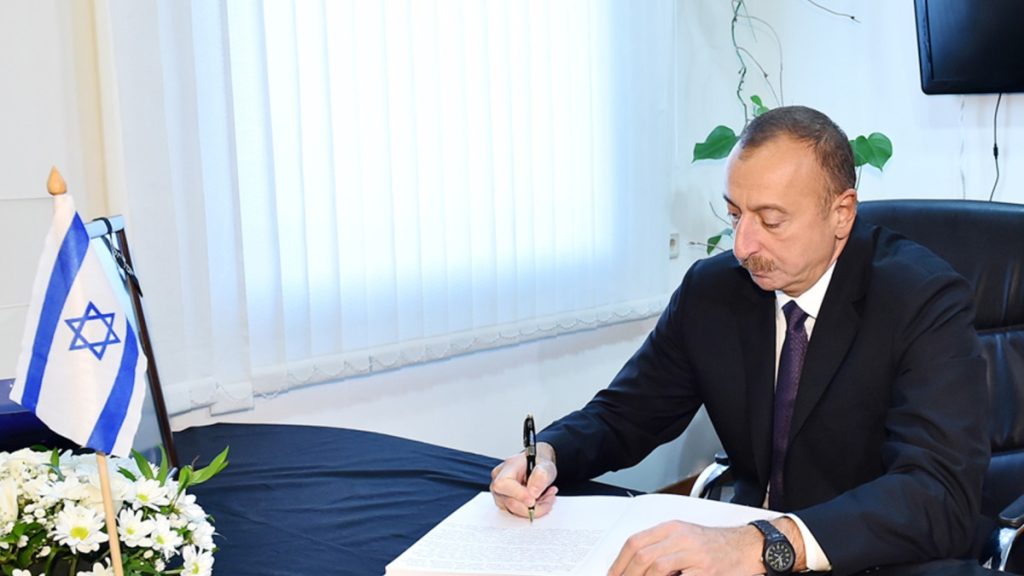Geopolitics is a world marked by the least likely of alliances. Strange bedfellows abound due to the eternal quest of states pursuing their national interest at all costs.
One needn’t look further at Israel’s intimate relationship with Azerbaijan to see this dynamic at play. How could Israel, a Jewish democratic state, pact with the likes of Azerbaijan, a secular authoritarian republic of predominantly Shia Muslim confession?
This alliance of convenience is forged by Israel’s desire to keep tabs on Iran — Israel’s primary geopolitical foe in the Middle East. A recent report by Israeli online newspaper Haaretz spilled the beans on the relationship between Azerbaijan and Israel, which involves Israel supplying the Azerbaijanis with state-of-the-art weaponry in exchange for “oil and access to Iran.”
According to the report, 92 cargo flights were carried out by Azerbaijani Silk Way Airlines over the past seven years, all which landed at the Ovda airbase. This base is the only airfield on Israeli soil where explosives can be flown into and out of the country.
Azerbaijan has allegedly let Israel’s Mossad intelligence agency set up shop on its soil to keep tabs on what’s going on in Iran. According to The Cradle, Azerbaijan built an airfield for Israel so that it can ostensibly carry out airstrikes on Iranian nuclear installations.
For its cooperation with Israel, Azerbaijan is able to receive high-tech weapons such as air defense systems, ballistic missiles, and kamikaze drones. Israeli-Azerbaijani defense ties are quite deep. Azerbaijani President Ilham Aliyev boasted back in 2016 that Azerbaijan had bought $4.85 billion in weapons from Israel. Azerbaijan has taken advantage of this relation to become Israel’s largest energy provider, with it exporting $434 million in crude petroleum in 2020.
The curious nature of Israel’s relationship with Azerbaijan was brought to public attention during the Second Nagorno-Karabakh War of 2020, which saw Azerbaijan come to blows with neighboring Armenia over the disputed Nagorno-Karabakh region. During this conflict, Azerbaijan deployed Israeli-supplied kamikaze drones against Armenia with devastating effects. As a result of these weapons sales, Armenia recalled its ambassador to Israel during the second Nagorno-Karabakh conflict.
Iran’s proximity to Azerbaijan makes it an obvious partner for Israel. Iran’s northwestern province of West Azerbaijan is of predominantly Azeri extraction. Moreover, as a multicultural polity, Iran has a significant number of Azeris that number roughly between 15 to 20 million. Due to the significant Azeri minority within Iran, there has been increased speculation that this part of its population could function as subversive agents against the Islamic Republic.
Israel is notorious for its covert operations, which are world class. The country lacks the strategic depth and manpower to carry out large conventional military operations. In light of these constraints, Israel will have to turn to its vaunted intelligence agencies to hold its rivals like Iran in check.
What’s more, the decline in United States influence in the Middle East — largely the product of the US focusing most of its attention towards its pivot to Asia — will compel Israel to re-calibrate its foreign policy. One way it will do so is to bolster its peculiar partnership with Azerbaijan, which has already demonstrated a willingness to transact with it on defense matters and house Israeli intelligence assets.
Should Iran face some form of sabotage attack within its borders in the near future, it would not be unreasonable to speculate that these plans were hatched in Azerbaijan or involved Mossad assets of Azeri extraction in Iran. When it comes to cold-blooded realism and unconventional geopolitical maneuvers, Israel stands out above the rest of its peers.

